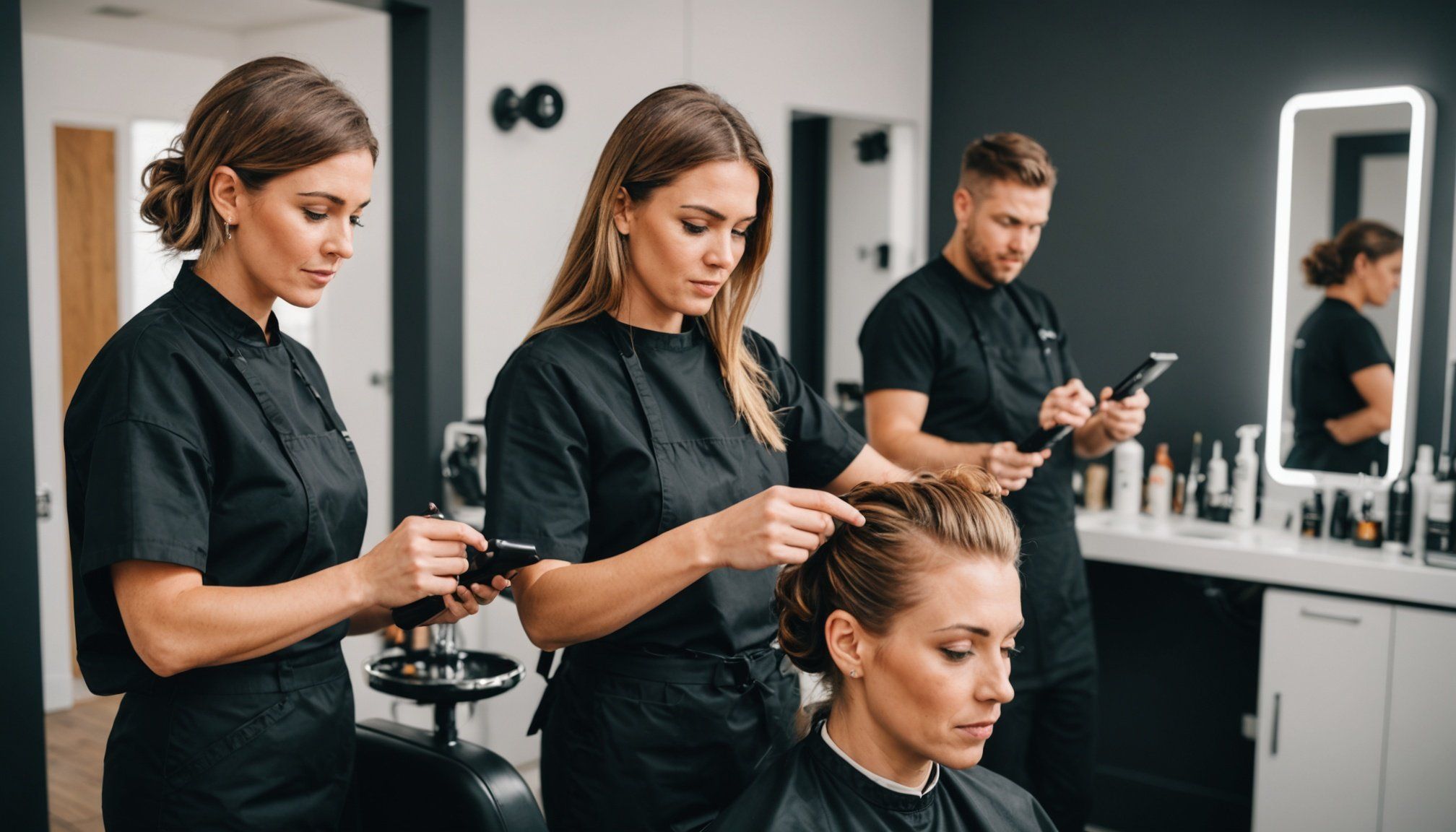Overview of 2023 UK Guidelines for Mobile Hair Salons
The 2023 UK guidelines for mobile hair salons emphasize critical regulations to ensure compliance within the industry. This year’s changes reflect advancements in best practices and increased focus on public health and safety. It is imperative for mobile hair salon operators to understand these updates thoroughly to avoid legal complications.
Key regulations encompass various operational aspects, including licensing, health, and safety, insurance, and marketing practices. Understanding the legal landscape helps operators stay ahead of regulatory requirements and maintain effective business practices. This is especially crucial as non-compliance can result in fines or operational bans.
Also to discover : Unlocking the path to reporting data privacy breaches: your comprehensive 2023 guide for uk businesses
The changes from previous years primarily address enhanced hygiene standards and customer service expectations, spotlighting the need for ongoing education and risk assessments. Compliance with these guidelines not only secures the salon’s operational status but also enhances its reputation amongst clients seeking reliable and hygienic services.
The evolving regulatory framework means that staying informed and adapting promptly can provide a competitive edge for businesses. Operators are encouraged to access official government and industry resources for updates, thus enabling them to navigate the complexities of the mobile hair salon industry successfully.
Have you seen this : 2023 Guide: The Latest Rules for UK Private Landlords on Protecting Tenant Deposits
Licensing Requirements
Understanding the Licensing regulations is pivotal for any mobile hair salon operator in the UK. Specific licenses are mandated to operate legally, which includes obtaining a personal’ service registration and a suitable mobile business license. The process begins with understanding the local council’s requirements, which can vary depending on the location of operation.
Applying for the necessary permits involves filling out detailed forms provided by local authorities, often accompanied by a fee. Ensuring that all staff hold up-to-date qualifications is also a checklist requirement for many councils. It is crucial, as operating without correct Licensing can result in severe penalties, including substantial fines and abrupt closures.
Operators should carefully research the locale’s specific licensing laws to ensure legal compliance. Comprehensive knowledge and timely application can prevent business disruptions and avoid legal costs. Proactively engaging with local councils and seeking legal advice can further streamline the Licensing and permit process, solidifying one’s standing in this competitive industry.
Health and Safety Regulations
For mobile hair salons, adhering to robust health regulations and safety standards is paramount. These guidelines are designed to protect both clients and practitioners from potential hazards. Essential practices include maintaining clean equipment and premises, ensuring that all tools are sterilised, and adhering to appropriate chemical use protocols. Practitioners need to implement rigorous hygiene practices to minimise infection risks, which is especially crucial in a mobile setting where space and facilities might be limited.
The adoption of comprehensive hygiene practices not only prevents infections but also bolsters client trust and satisfaction. Consistent sanitation of tools, alongside ensuring clean uniforms and surfaces, are vital components.
Furthermore, conducting regular risk assessments is instrumental. This involves identifying potential hazards, evaluating risks, and implementing measures to mitigate them. Operators should include detailed safety briefings for their staff to keep everyone informed and prepared.
Understanding the intricacies of these health regulations can safeguard a mobile salon against legal repercussions and enhance its reputation. By prioritising safety, mobile hair salons not only comply with the law but also reassure clients of their commitment to health standards, promoting a sense of reliability and professionalism.
Insurance Requirements
Navigating the Insurance landscape is crucial for mobile hair salons to ensure comprehensive liability protection and safeguard against unexpected incidents. Various types of business coverage are indispensable, each serving a unique purpose in shielding operators from financial risks. Business insurance should typically include public liability insurance, professional indemnity, and equipment insurance.
Choosing the right insurance provider demands careful consideration. It is advisable to assess providers based on their reputation, coverage options, and the specific needs of mobile hair salons. Ensure they can offer tailored policies that address the dynamic nature of mobile operations. Review real-life scenarios where insurance played a pivotal role in saving businesses from significant losses due to accidents or customer claims.
Consider a scenario where a stylist accidentally spills a chemical product, causing skin irritation to a client. Without proper insurance coverage, this could result in substantial compensation claims. Such examples highlight the vital importance of adequate protection for safeguarding both financial stability and professional reputation. Secure the right liability protection early to focus on delivering outstanding services while having peace of mind regarding potential risks.
Marketing Strategies
For mobile hair salons, crafting effective marketing strategies can significantly boost customer acquisition and brand visibility. A solid marketing plan involves a blend of digital and traditional tactics designed to capture a broader audience.
Emphasising an engaging online presence is crucial. Establishing a robust branding strategy through social media platforms such as Instagram and Facebook can help showcase your salon’s unique style and services. Regularly updating your profiles with before-and-after shots, client testimonials, and promotional offers can draw attention and foster client interest.
In addition, consider strategies for local advertising and networking. Participating in community events or collaborating with local businesses can enhance your salon’s recognition and credibility. Such initiatives bridge connections within the community, driving word-of-mouth referrals which are invaluable for growth.
To round out your marketing efforts, invest in targeted advertising campaigns that reach potential clients in your geographic area. Google Ads or local social media ads can be instrumental in attracting nearby customers looking for convenient, mobile services.
Ultimately, a balanced marketing approach prioritising both branding and client acquisition will lay the foundation for sustained business success in the competitive mobile hair salon industry.
Managing Client Relationships
Client management is crucial for sustaining a successful mobile hair salon. Nurturing a strong rapport requires exceptional customer service and effective retention strategies to ensure clients return for services repeatedly. Achieving this involves understanding client preferences and consistently delivering personalised experiences. Begin by maintaining open and regular communication to keep clients informed about services and any changes.
Effectively managing client expectations and promptly addressing concerns fosters trust and loyalty. Implement strategies such as loyalty programs or exclusive promotions to retain clients. These efforts make clients feel appreciated and encourage continued patronage.
Gathering client feedback is essential to gather insights into service improvements and understand customer satisfaction. Employ surveys or direct conversations to collect opinions. Once feedback is received, take active steps to rectify issues or enhance services, demonstrating that client voices matter.
Enhancing customer satisfaction goes beyond interactions; it is about consistently meeting client needs and adapting to their evolving preferences. Personalised care and consideration reinforce the client’s perception of value, ultimately boosting retention. Building lasting relationships depends on thoughtful engagement, meticulous attention to detail, and a genuine commitment to exceeding client expectations.
Resources and Official Links
Navigating the intricate landscape of the mobile hair salon industry requires access to reliable resources and official guidelines. These are pivotal in ensuring that operators are equipped with up-to-date information on regulatory changes and best practices.
Mobile salon operators should prioritise accessing key government and industry resources. These platforms provide comprehensive insights into licensing, health regulations, and insurance requirements. The UK government website is a primary source for official documentation detailing necessary compliance standards.
Subscribing to industry publications and newsletters ensures that operators stay informed about support organizations that offer guidance and advocacy. These connections can be invaluable for developing new strategies or addressing operational challenges.
Remaining informed about regulatory updates is critical to maintaining compliance and avoiding potential legal issues. Frequent consultation of official resources not only aids in understanding the evolving regulatory framework but also empowers operators to adapt seamlessly.
Remember, leveraging these resources enhances business acumen and promotes operational efficiency, ultimately contributing to the long-term success of any mobile hair salon. By actively engaging with these avenues, operators can nurture a robust foundation for navigating the competitive hair salon industry with confidence.
Case Studies and Real-Life Examples
Case Studies offer rich insights into the practical application of regulations and compliance within the mobile hair salon industry. Successful mobile hair salons, like “Glam on the Go” and “Rollin’ Cuts,” showcase how diligent adherence to health regulations and safety standards not only ensures client safety but also enhances business reputation and growth.
For instance, “Glam on the Go” distinguished itself by strictly implementing rigorous hygiene practices. This practice not only safeguarded client health but also resulted in positive reviews and increased customer trust. Such success stories illustrate the profound impact of following prescribed regulations and maintaining high operational standards.
On the other hand, “Style Wheels” faced challenges due to overlooking mandatory compliance measures, highlighting the consequences of neglecting key regulations. This illustrates the importance of comprehensively understanding the legal landscape and adapting accordingly to avoid potential pitfalls.
Real-life examples highlight lessons learned, emphasizing the importance of proper risk assessments and effective client management. These narratives from industry professionals bring to light the value of learning from experience and underscore the necessity of staying informed about evolving guidelines to thrive in this competitive industry.











